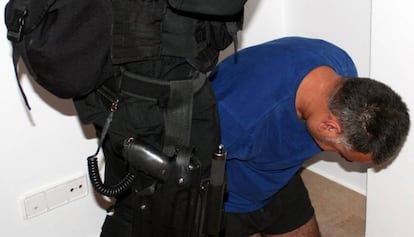Why is Irish drug trafficker Christy Kinahan still at liberty on the Costa del Sol?
Case against gang leader tied up in red tape and delays after six years

More than six years after Christy Kinahan was arrested in Spain as part of a huge operation to smash his alleged global drugs and weapons business, the Irishman and his cohorts remain at liberty, thanks in large part to the inefficiency of the Spanish legal system.
“We’re used to trials being delayed here on the Costa del Sol, but this is unheard of,” says an unnamed civil servant, voicing a view shared by other judicial officials.
In August, an Irish tourist named as Trevor O’Neill was gunned down in Mallorca
In May 2010, after a two-year investigation involving the Spanish, Irish, British, Belgian and Dutch authorities and involving some 700 officers in total, Spanish police moved against Kinahan and his gang with coordinated surprise raids and arrests on Costa del Sol addresses registered to him. More than 30 people were arrested in so-called “Operation Shovel” throughout Europe, among them Kinahan and several of his associates and family.
The investigation focused not only on drug-trafficking but also on the money-laundering and property investments in which Kinahan, who was arrested at his Marbella villa, was allegedly involved.
But after being held briefly, Kinahan and his associates were released without charge. Operation Shovel was unable to find enough direct evidence to link Kinahan to specific crimes they could be charged with.
The Irish authorities believe Kinahan was not only laundering his own money and buying property with it, but that he had also acted as a financial services agent for other criminal gangs.
Kinahan is believed to be the key wholesaler of drugs to the Irish market, and he is also accused of supplying the United Kingdom and other countries, activities that have allowed him to amass a vast personal fortune.
Regarded as one of the most intelligent Irish criminals involved in the international drugs trade, the separated father-of-three speaks several foreign languages, including Dutch and Spanish.
Kinahan is believed to be the key wholesaler of drugs to the Irish market
In 1987 he was jailed for six years after pleading guilty to possessing heroin valued at more than €150,000. In 1998 he was jailed for four years after he was found in possession of £16,000 in stolen travelers’ checks.
He was released from prison in Ireland in 2001, leaving for Spain shortly after. On moving there, say Spanish police, he immediately established international drug-dealing contacts. He has a villa near Marbella valued at €6 million, and also regularly uses a nearby apartment worth €1 million.
Over the last 15 years, he is believed to have organized massive drug shipments from Colombian, Spanish and North African cartels for sale to Irish criminals.
Five years ago he was convicted of money laundering in Belgium, and jailed for four years. Police say they found assets attributable to him of more than €2.5 million
At the same time, Kinahan, who had always managed to avoid gangland disputes, has become involved in a bloody feud that has spilled over into Spain.
In 2010, at the time of Operation Shovel, Kinahan was already believed to be involved in around 20 murders. One of them was that of Paddy Doyle in the Costa del Sol resort of Estepona two years earlier. Doyle had links to criminal gangs in Dublin, say police.
After being held briefly, Kinahan and his associates were released without charge
As part of the operation, a 34-year old man named Gary Hutch was arrested in Dublin. The Kinahan gang murdered him in Marbella in September 2015.
That killing set off a feud between Hutch’s gang in Dublin and members of the Kinahan gang in Spain and its contacts in Dublin.
The Irish police believe the attack at the weigh-in for a boxing match at the Regency Hotel in Dublin in February was an attempt by Hutch’s associates to target members of the Kinahan gang who were in the Irish capital.
The man shot dead, David Byrne, split his time between Dublin and Spain. The another target was Kinahan’s son, Daniel, who had traveled from Spain for boxing match.
Daniel Kinahan is believed to run the smuggling of drugs and weapons into the United Kingdom, while Christy Junior runs the organization’s finances, laundering hundreds of millions of euros around the world.
Kinahan’s men have since retaliated, shooting dead eight men around the Irish capital who were either related to Hutch or worked for his gang.
In August, an Irish tourist named as Trevor O’Neill was gunned down in Mallorca after being mistaken for a member of the Hutch family.
The incident in Mallorca brings to 10 the number of people shot dead in 10 months; two in Spain and eight in Ireland.
None of the killings have been solved, although Spanish police arrested an Irish national at Madrid’s Barajas Airport three months ago who was allegedly linked to the killing of Gary Hutch.
Sources close to the cases being brought against Kinahan say that it is not just the Spanish legal system that is to blame for the lack of progress: they say that Brazil has taken five years to respond to requests for information; the Cypriot authorities have only provided information in the last few weeks, although the Spanish authorities reportedly allowed a translation company more than 18 months to translate documents into Greek. The United Kingdom has yet to answer Spanish requests, saying that they were sent in Spanish and must be translated into English.
English version by Nick Lyne.
Tu suscripción se está usando en otro dispositivo
¿Quieres añadir otro usuario a tu suscripción?
Si continúas leyendo en este dispositivo, no se podrá leer en el otro.
FlechaTu suscripción se está usando en otro dispositivo y solo puedes acceder a EL PAÍS desde un dispositivo a la vez.
Si quieres compartir tu cuenta, cambia tu suscripción a la modalidad Premium, así podrás añadir otro usuario. Cada uno accederá con su propia cuenta de email, lo que os permitirá personalizar vuestra experiencia en EL PAÍS.
¿Tienes una suscripción de empresa? Accede aquí para contratar más cuentas.
En el caso de no saber quién está usando tu cuenta, te recomendamos cambiar tu contraseña aquí.
Si decides continuar compartiendo tu cuenta, este mensaje se mostrará en tu dispositivo y en el de la otra persona que está usando tu cuenta de forma indefinida, afectando a tu experiencia de lectura. Puedes consultar aquí los términos y condiciones de la suscripción digital.









































